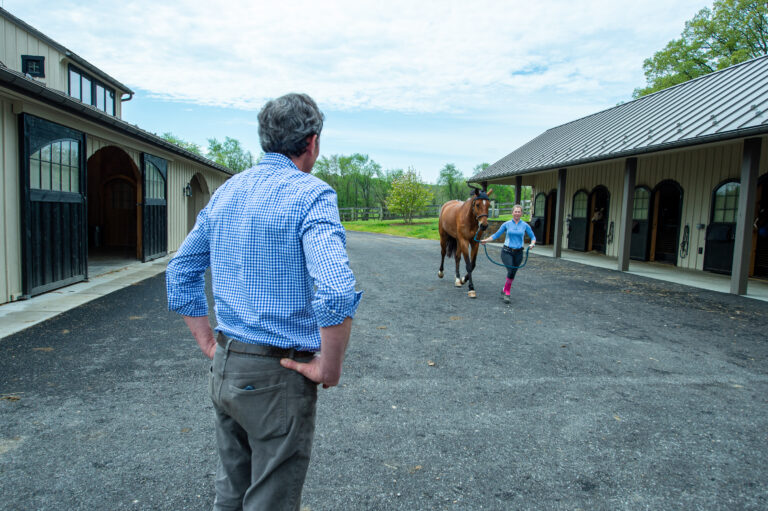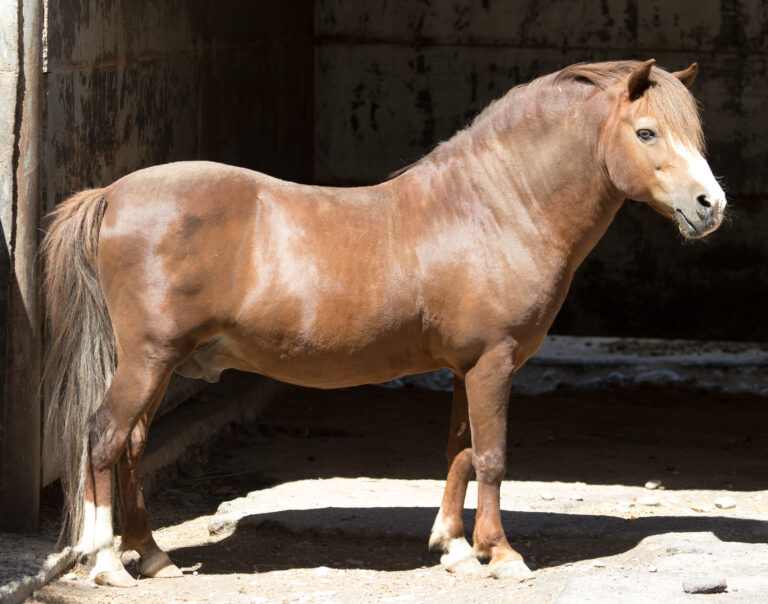
Soaring inflation and post-pandemic financial hardships have contributed to the ongoing onslaught of disheartened Facebook posts that read, “Free to a good home: can no longer afford to keep my retired 31-year-old pony. Has Cushing’s, arthritis, and laminitis. ISO companion-only home.”
Such ads almost always trigger avalanches of cautionary tales from fellow horse owners in the comments, warning about the uncertain fate of “free” horses. When navigating these delicate situations, veterinarians can offer resources and guidance to help well-intentioned, cash-strapped horse owners do right by their animals.
The Financial Strain on Horse Owners
The cost of keeping a horse for its 25-year average lifetime can range from $215,000 to $575,000, according to the recent Synchrony study discussed in our 2024 CareCredit special issue. However, owners underestimate annual expenses by up to 363%, and 85% of them feel anxious about their horse-related expenditures. The survey also tells us that 90% of people plan to keep their horses for life, a statistic likely compromised by recent economic conditions.
Indeed, the horse ownership price tag has skyrocketed since the start of the COVID-19 pandemic and remains high. A 2021 survey conducted by the American Horse Publications (AHP) sheds light on two of the most pressing issues affecting the equine industry today: in-transition or at-risk horses and the cost of horse-keeping. Veterinary services (41% of respondents) and animal health products (39%) were among the top three most frequently cited increased expenses.
As barn owners struggling to cover basic expenses such as hay and bedding raise board prices, equestrians are seeing their finances strained by everything costing more. As a result, being “priced out of horses” has become a harsh reality for some. So, what happens to those equines whose owners can’t afford them anymore?
An Attractive Solution: The ‘Good Home’ for the Unsellable Horse
Healthy, sound, trained horses can generally be privately sold or leased out to offset expenses. The options are much more limited for those that fall in the unsellable category and become “unwanted,” also called at-risk or in-transition horses. Think of the very old, unhandled, behaviorally challenging, lame, and sick or injured animals.
Realistically, if a horse owner is having trouble paying for their own high-maintenance, unrideable animal that, let’s say, requires lifelong daily medication, soaked hay pellets, and corrective shoeing, it’s unlikely a stranger will volunteer to inherit the financial and logistical burden. The desperate owner can then feel pressured to give their horse away in exchange for the promise of a good, forever home.
“My concern when I see well-intentioned owners giving their senior or lame horses away for free online is, ‘Where are they going to end up?’ ” said Tahlia Fischer, founder and director of All Seated in a Barn, a nonprofit equine sanctuary aimed at rescuing slaughter-bound horses and donkeys based in Bakersfield, California. “Ninety-nine percent of the population interested in rehoming horses is not willing to take in old, lame animals—and these individuals end up at auctions and kill pens,” she says from experience.
“While a select few may be lucky enough to find the fairy tale farm out in the country where horses can be donated and retired—such as breed-specific nonprofit sanctuaries like Old Friends for Thoroughbreds—most owners don’t have that option,” added Bart Sutherland, DVM, chair of the American Association of Equine Practitioners (AAEP) Welfare & Public Policy Advisory Council and a private practitioner based in Oxford, Mississippi.
Equestrians who give their horses away in good faith don’t always realize the uncertainty of their animals’ future. “Free” horses can become prey to unethical flippers disguised as genuine horse lovers, who will mask physical and behavioral issues with medication to make a quick buck. Others will be sent to various auctions where the risk of being shipped across either border—Canada or Mexico—to a slaughterhouse is a very real concern.
Alternative Rehoming Options for Horses
Many horse owners view their veterinarians as respected authority figures and rely on them for guidance. Therefore, those needing to rehome their horses might turn to their vets for help. Depending on the situation, practitioners can encourage horse owners to explore the following alternatives to listing an equine companion online for free:
- Send the horse to a reputable layup or retirement farm in a part of the country that has a lower cost of living. This arrangement has the potential to significantly reduce the owner’s board bill while allowing them to maintain control and have the peace of mind the animal is receiving the same standard of care.
- Donate the horse to a reputable therapeutic horsemanship program. In addition to providing a tax write-off that can relieve the financially strained horse owner, leasing or donating a serviceably sound horse or pony to an accredited, trustworthy facility ensures ongoing care for the animal.
- Donate the horse to a university program. Several higher education institutions nationwide rely on donated horses for their riding and educational programs. Encourage your client to research the institution beforehand and require a right of first refusal for the donated horse. This option also generally comes with the benefit of a tax write-off.
- Place the horse with a sanctuary or rescue. Nonprofits that accept owner surrenders should be considered a last resort, as these donation-based, volunteer-run organizations are often stretched thin financially themselves. If possible, the owner should offer to “sponsor” their horse to cover at least part of their expenses once donated to a sanctuary.
- Offer a pasture-sound horse on a care lease as a companion animal. A horse owner might have a mutually beneficial opportunity to allow a farm to borrow and care for their horse while retaining ownership and a say in their care.
- Utilize the United Horse Coalition’s Equine Resource Database, which includes financial assistance and guidance, hay and feed banks, veterinary and euthanasia support, equine rescue and sanctuary connections, long-term care and rehoming options, and educational resources.
While these potential solutions are highly case-dependent and might not be suitable for every situation, Fischer considers exploring them part of the owner’s due diligence. “Though it’s not as quick and easy as posting a horse online [for free], taking the time to research and reach out to rescues and sanctuaries, for example, is a must,” she said.
Is Euthanasia an Acceptable Option?
For the old, crippled horse whose owner absolutely cannot keep—or place elsewhere—is humane destruction a viable alternative? The answer isn’t black or white, our sources say. “The American Association of Equine Practitioners has a set of euthanasia guidelines geared at what is best for the horse,” Sutherland pointed out.
The AAEP presents four specific scenarios for which humane euthanasia is “a responsible treatment option” and an acceptable, ethical solution:
- Continuous or unmanageable pain from a condition that is chronic and incurable.
- A medical condition or surgical procedure with a poor prognosis for a good quality of life.
- Continuous analgesic medication and/or box stall confinement for the relief of pain for the rest of its life.
- An unmanageable medical or behavioral condition that renders [the horse] a hazard to itself or its handlers.
“If the horse is lame and cannot live the quality of life that they deserve, then humane euthanasia needs to be considered,” said Fischer. “The horse’s owner is responsible for setting up their animal for long-term success,” she added, whether or not they keep the animal. Bottom line: Giving an unsellable horse away is rarely the answer, as relinquishing ownership voids an owner’s power to ensure a dignified end to their animal’s life.
Podcast: Equine Euthanasia: Knowing When It’s Time, with Dr. Sara Cook
Final Thoughts
In Sutherland’s experience, “there are true situations that arise in life beyond a person’s control that unfortunately require an owner to surrender their horse.” That being said, he believes preparation can prevent many unwanted horse situations in the first place. His No. 1 recommendation to aspiring owners is to anticipate and budget for the total cost of horse ownership before making such a big commitment. As trusted experts, Sutherland and other veterinarians can influence horse owners to make ethical decisions to ensure the welfare of their animals—for life.
Related Reading
- Horse Ownership Is a Choice
- Preparing Horse Owners for Unexpected Health Expenses
- Handling Payment in the Field
Stay in the know! Sign up for EquiManagement’s FREE weekly newsletters to get the latest equine research, disease alerts, and vet practice updates delivered straight to your inbox.

![[Aggregator] Downloaded image for imported item #18711](https://s3.amazonaws.com/wp-s3-equimanagement.com/wp-content/uploads/2025/10/20105749/EDCC-Unbranded-14-scaled-1-768x512.jpeg)
![[Aggregator] Downloaded image for imported item #18782](https://s3.amazonaws.com/wp-s3-equimanagement.com/wp-content/uploads/2025/11/03125751/EDCC-Unbranded-13-scaled-1-768x512.jpeg)

